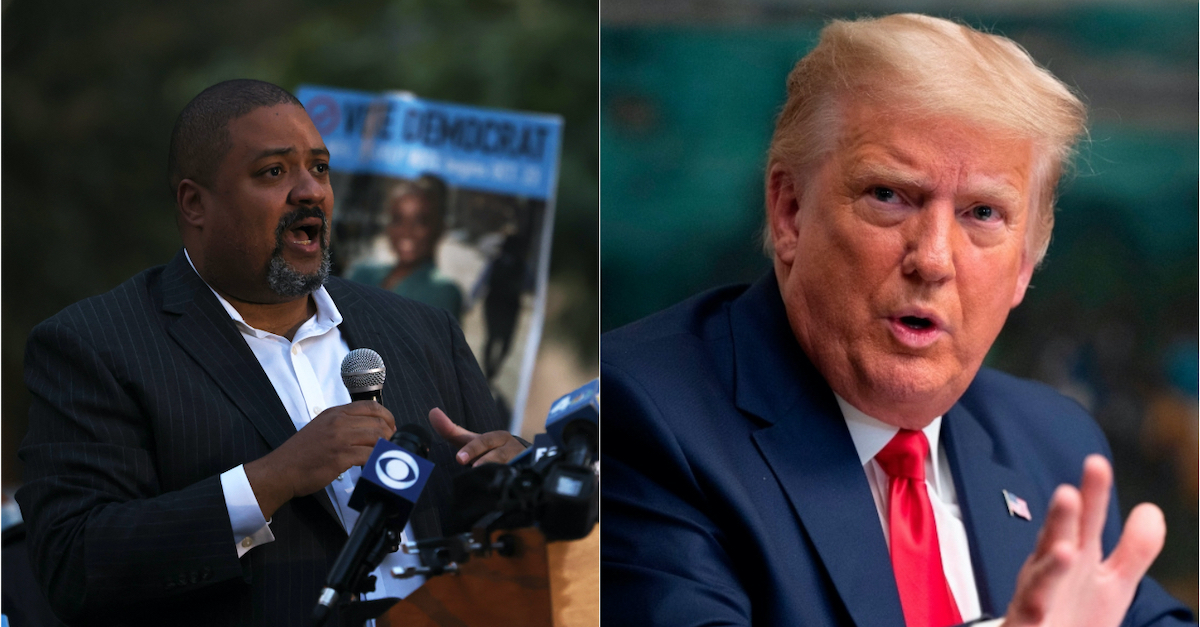
Alvin Bragg and Donald Trump
Listen to the full episode on wherever else you get your podcasts, and subscribe.
Once considered one of most dangerous criminal probes orbiting the former president, the Manhattan district attorney’s investigation that led to indictments against Donald Trump’s business and former associate Allen Weisselberg does not appear poised to go much farther.
Officially, the investigation continues, but two of its top prosecutors—Carey Dunne and Mark Pomerantz—resigned late last month. A recent New York Times exposé on the heated arguments preceding their departure suggest both men strongly disagreed with Manhattan District Attorney Alvin Bragg’s decision not to bring charges against Trump himself. The Times quoted Dunne explaining his need to “disassociate myself with this decision because I think it was on the wrong side of history.”
On the latest episode of Law&Crime’s podcast “Objections: with Adam Klasfeld,” former Brooklyn prosecutor, current criminal defense attorney, and Law&Crime Network analyst Julie Rendelman provides insight on line prosecutors’ disagreements with district attorneys—and what this clash could mean for the future of the Trump probe.
“You’ve heard that saying, ‘You can indict a ham sandwich,’ and in many ways, it’s true,” Rendelman notes. “You can indict a ham sandwich. It doesn’t take much to get you indicted. It takes a whole hell of a lot in order to prove beyond a reasonable doubt that someone is guilty. And with Trump, it’s not just about whether he cooked the books. It’s also whether he intentionally cooked the books for the purpose of some level of criminality.”
Criminal and civil investigations against Trump and his businesses in New York derive largely from evidence and testimony by his former fixer Michael Cohen, who told Congress in 2019 that the former president inflated the value of certain assets for tax benefits.
That year, New York Attorney General Letitia James (D) and ex-Manhattan District Attorney Cyrus Vance (D) opened their respective investigations into Trump’s finances. Bragg (D) inherited Vance’s probe after his predecessor successfully fought up to the Supreme Court to obtain Trump’s tax records. Last month, in what appeared to be a breakthrough for both investigations, Trump’s accounting firm Mazars essentially retracted a decade’s worth of the former president’s statements, and a Manhattan judge ordered Trump and two of his adult children to sit for depositions.
Then, roughly a week later, the resignations threw a wrench in the case just a month before the term of the grand jury investigating Trump expires.
“I don’t think it’s wrong of Bragg coming in in January to not be in a rush to indict Trump without having his own thorough investigation as to what transpired,” Rendelman opined.
“I think the question on everyone’s mind is, is he saying the kibosh means that I’m not going forward period—because we know that the the grand jury was set to end in April—or is he saying I can’t be on Vance’s timeline, I have to be on my timeline,” she added.
Like most legal experts, Rendelman noted that a case against Trump would be tough. Trump famously does not send emails or texts. Weisselberg, the Trump Organization’s ex-chief financial officer, vigorously denied the charges filed against him last summer and has not shown any signs of willingness to cooperate against the former president. That leaves Cohen as one of the only witnesses who could speak to Trump’s intent.
“Michael Cohen was convicted of lying,” Rendelman said. “So you have your main witness already being able to be cross-examined by I’m sure a very, very capable defense attorney that he has lied and that he’s been convicted of lying. So that’s the first issue. The second big problem […] is they can’t seem to get anyone to flip.”
A former homicide prosecutor, Rendelman knows what happens to a case when key pieces of evidence may not be available. She is the host of Law&Crime’s upcoming podcast about how prosecutors pursue their case when the dead cannot be found. The show is titled, “Without a Body.”
“We may believe in a case,” she said. “We may believe with every fiber of our being that an individual is guilty of a crime, but still never be able to get that piece. Now, what is that piece for Trump? I don’t know. Is the piece a cooperator? Is the piece of confession? That’s never going to happen.”
Listen to the podcast, below:
(Photo of Alvin Bragg by Michael M. Santiago/Getty Images; Photo of Trump via Nicholas Kamm/Getty Images)